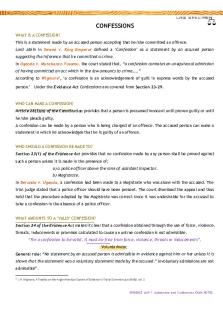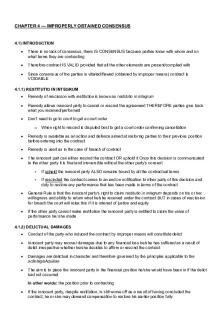16. Confessions and unlawfully or unfairly obtained evidence PDF

| Title | 16. Confessions and unlawfully or unfairly obtained evidence |
|---|---|
| Author | Jeremiah Vun |
| Course | Criminal Litigation |
| Institution | BPP University |
| Pages | 5 |
| File Size | 147.5 KB |
| File Type | |
| Total Downloads | 58 |
| Total Views | 244 |
Summary
16. Confessions and unlawfully or unfairly obtained evidence the definition of confessions under PACE admissibility and exclusion of confessions determining the admissibility of confessions and the voir dire procedure the admissibility of evidence obtained as a result of inadmissible confessions the...
Description
16. Confessions and unlawfully or unfairly obtained evidence 1. the definition of confessions under PACE 2. admissibility and exclusion of confessions 3. determining the admissibility of confessions and the voir dire procedure 4. the admissibility of evidence obtained as a result of inadmissible confessions 5. the exclusion of other prosecution evidence at common law and under section 78 of PACE 6. common categories of evidence that may be the subject of applications to exclude under section 78 7. making or challenging applications to exclude evidence under section 78 Confessions Title General principles
Description Confession means any statement/action (nod, movements) made to ANYONE that is whole or partly adverse to the person who made it Rules 1. Person MUST be the maker of the statement 2. May be made through action 3. Conduct not intended to convey guilt is not a statement, therefore not confession. o E.g. driving away from crime scene not confession, though may be admissible in other ways s. 76 PACE: confession through oppression is inadmissible. s. 78 PACE: evidence unfair to the proceedings Good alternative 114(1)(d) – admission of hearsay in the interest of justice
Guilty pleas
Guilty pleas are confessions. Even if it was retracted, it may be used as evidence of confession if they Pass s. 76 – not made in oppression Pass s. 78 – not unfair to the proceedings adduce the evidence
Mixed statements
Partly and Wholly Exculpatory Statements Party exculpatory statements are admissible as they have an element of confession Wholly exculpatory statements are not confessions.
Exclusion of confession s. 76
s. 76 PACE Confessions may be excluded if (a) Obtained by oppression Torture Inhuman or degrading treatment Use of threat or violence
Title
Description Examples: Shouting in interview may not be oppression, it depends on degree and if confession is compromised. (b) Obtained in consequence of something said or done to render it unreliable The question is whether anything was done to make confession unreliable (NOT whether it was actually unreliable) Court may consider the ENTIRE situation (anything said or done) Does not include self-induced confessions (without external influence) Includes other types of oppression not listed above General rules This is a serious provision to rely on as it may put officers under inquiry (if applicable, apply under s. 78) To rely on confession, prosecution must prove beyond reasonable doubt that 76 does not apply only if Court asks or Defendant applies that it is inadmissible under s. 76. o Court has NO DISCRETION to admit if P cannot prove beyond reasonable doubt. Court may consider the type of man it is dealing with (first time criminal or seasoned offender or mentally ill) Breach of PACE does not directly lead to exclusion, though it may be relevant evidence Where 76 applies, it CANNOT be admissible under s. 78 or 114(1)(d) interest of justice Discovery of evidence Where a confession made inadmissible by s. 76 leads to the discovery of evidence, it will not affect the admissibility of that evidence (may be excluded under 78). Discovery of slow speech, writing or expression Examples If tape recorded confession showed defendant speaking with a lisp and the prosecution possess an incriminatory audio recording, that is admissible. If the confession involved writing a word spelt unusually and the prosecution possess evidence with the same unusual writing.
Exclusion of confession s. 78
s. 78 PACE Confessions (or any other evidence tendered my prosecution) may be excluded if it has such an adverse effect on the proceedings that it ought to be excluded. General rules VERY RARE for appeal court to overturn discretion here unless it was wrongly exercised or perverse. Defendant must prove on a balance of probability Breach of PACE does not directly lead to exclusion, but breach of PACE often leads to s.78 exclusions.
Title
Challenging a confession
Description Considerations (a) Nature and extent of the breach (b) Breach of right to legal advice (as this is fundamental) Includes failure to inform of his rights to legal advice Unless there exists compelling reasons to disallow (national security, public safety); or Unless the proceedings as a whole was fair (c) Breach of interview procedures (see if this is unfair to proceedings) (d) Whether police acted in bad faith when in breach In bad faith, then more inclined to exclude In good faith, usually also exclusion but it will depend if it is unfair to proceedings. (e) Self-induced incapacity is relevant here (unlike s. 76) Voir Dire A hearing of preliminary facts relating to the admissibility of evidence Examples: Competence of witness Admissibility of confession (or plea of guilty which was withdrawn) Etc Step 1: Defence notify prosecutor of its intention to exclude (before it is admitted as evidence) If apply AFTER admission, judge may not allow to withdraw the evidence. Step 2: Prosecution will not raise it in its opening speech to jury Step 3: Voir dire MAY be held at an appropriate time Parties are NOT ENTITLED to Voir dire o May be appropriate for limited issues, not long drawn out issues better heard at trial Submissions may be made with evidence. o Focusing on the exclusionary rules of evidence o Usually prosecution is heard first The court MAY ask the jury to withdraw. o If in magistrates, may consider whether substantive hearing should be conduced by different bench Court may, (in rare circumstances) on its own motion ask the prosecution to prove its evidence should not be excluded in a voir dire Voir dire may be used in summary trials (where the judge is the tribunal of both fact and law) o should NOT voir dire if it can be settled as a preliminary matter in a preliminary hearing o It is up to the magistrate to issue a ruling (immediately or after hearing)*, but the later it is heard, the defendant will be more prejudiced Don’t know crucial evidence (e.g. whether confession is admissible)
Title
Description Cannot expose irregularities without exposing himself to cross examination
Title General principle
Unlawfully, improperly or unfairly obtained evidence Description Where illegally obtained, Court has power to stay proceedings. Where court does not stay proceeding, unlawfully, improperly or unfairly obtained evidence may be admissible. The test Irregularly obtained evidence is admissible (courts are not concerned with the method evidence is obtained) Examples: Documents protected by legal professional privilege and irregularly obtained are admissible.
Exceptions
Procedure
(a) Evidence obtained by torture Torture means the infliction of severe pain or suffering inflicted by a person exercising its public duties. (b) Evidence obtained by inhuman or degrading treatment Not as direct as torture. MAY still be admitted. Consider the rights of the Defendant. (c) Evidence obtained by a VERY serious and substantial breach of PACE even in good faith and this MUST have caused unfairness Serious breaches include: failure to caution and keep a proper interview record, failure to allow accused to check interview transcript, failure to inform right to legal advice, failure to issue caution) (d) Eventually excluded s. 78 (unfair to the proceedings) (e) Eventually excluded by common law Where its probative value is outweighed by its prejudicial effect (falls under 78 too) Evidence obtained by unlawfully, improper or unfair means and operates unfairly against accused (falls under 78 too). (f) Eventually excluded by other statutory powers S. 101(3) CJA – excluding bad character evidence on fairness S. 126 CJA – excluding hearsay statements where prejudice outweighs probative value See procedure above on voir dire...
Similar Free PDFs

Improperly obtained evidence
- 3 Pages

Admissions AND Confessions
- 7 Pages

Improperly Obtained Consensus
- 5 Pages

Confessions Summary
- 1 Pages

2. Confessions to Crime
- 1 Pages

Tendency and coincidence evidence
- 17 Pages

Evidence sports and animals
- 2 Pages

Character Evidence and Impeachment
- 11 Pages
Popular Institutions
- Tinajero National High School - Annex
- Politeknik Caltex Riau
- Yokohama City University
- SGT University
- University of Al-Qadisiyah
- Divine Word College of Vigan
- Techniek College Rotterdam
- Universidade de Santiago
- Universiti Teknologi MARA Cawangan Johor Kampus Pasir Gudang
- Poltekkes Kemenkes Yogyakarta
- Baguio City National High School
- Colegio san marcos
- preparatoria uno
- Centro de Bachillerato Tecnológico Industrial y de Servicios No. 107
- Dalian Maritime University
- Quang Trung Secondary School
- Colegio Tecnológico en Informática
- Corporación Regional de Educación Superior
- Grupo CEDVA
- Dar Al Uloom University
- Centro de Estudios Preuniversitarios de la Universidad Nacional de Ingeniería
- 上智大学
- Aakash International School, Nuna Majara
- San Felipe Neri Catholic School
- Kang Chiao International School - New Taipei City
- Misamis Occidental National High School
- Institución Educativa Escuela Normal Juan Ladrilleros
- Kolehiyo ng Pantukan
- Batanes State College
- Instituto Continental
- Sekolah Menengah Kejuruan Kesehatan Kaltara (Tarakan)
- Colegio de La Inmaculada Concepcion - Cebu







